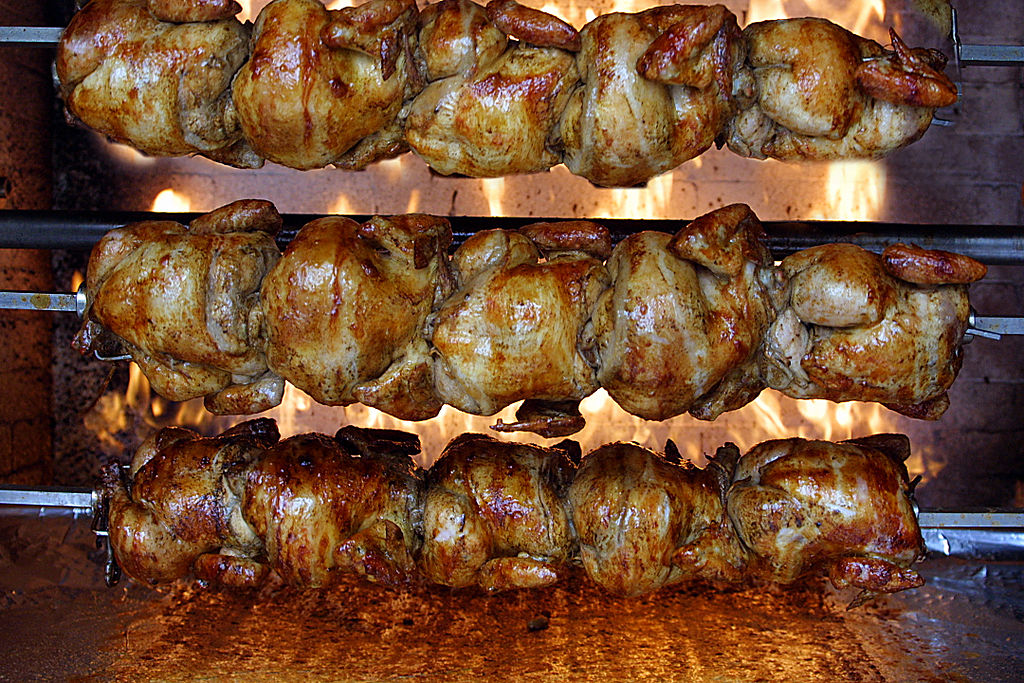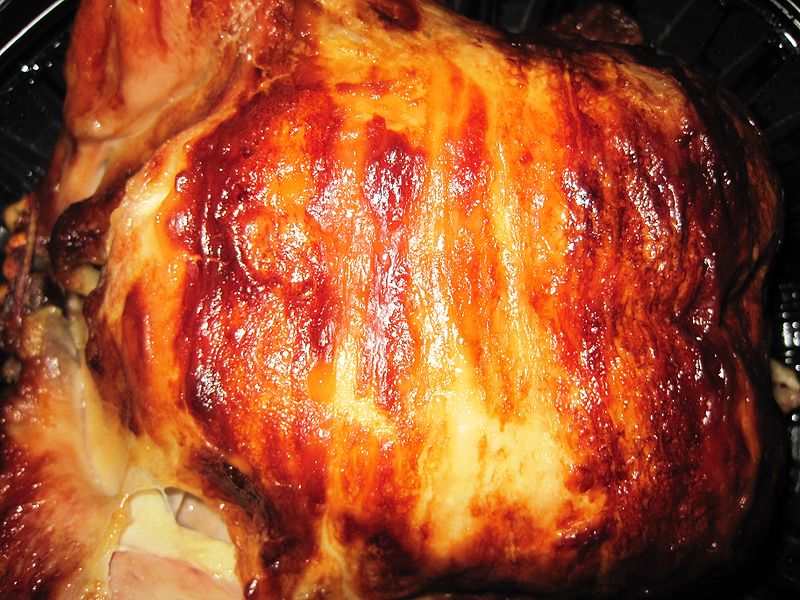Rotisserie chicken is a chicken dish that is prepared by placing the chicken adjacent to the heat source and cooking it on a rotisserie using direct heat. With adjustable infrared heat, heating components powered by gas or electricity can be utilized. For preparing rotisserie-style chicken, these rotisseries have been shown to be highly useful[1].
High in protein, rotisserie chicken is nutritious and a major source of several essential elements, including zinc, selenium, and vitamin B6. Additionally, it’s a simple and quick lunchtime staple that can be found at most grocery stores. These affordable, fully cooked, seasoned, and fresh chickens are prepared for consumption[2].
You can enjoy rotisserie chicken in a variety of dishes, such as soup, chicken salad, sandwiches, or tacos.

The Golden Rule: Time is of the Essence for Storing Rotisserie Chicken
Considering your plans, the following advice relates to storing rotisserie chicken:
Short Term Storage: – If you intend to eat the chicken right away, store it at room temperature for no longer than 2 hours after buying it.
- Cover the chicken with aluminum foil or store it in an airtight container to preserve its juices.
Before serving, reheat it in the oven, microwave, or stovetop.

- Short-Term Storage (1-2 Days): – Put the rotisserie chicken in the refrigerator 2 hours after you buy it.Do not keep the chicken in the refrigerator while it is hot; let it cool.
- Take the meat off of the bones and put it in a container that can keep it fresh.
- To ensure maximum freshness, consume it within 1-2 days.
- Long-Term Storage (Freezing): Freeze the chicken if you wish to save it for a later time.
- Take the meat out of the bones and firmly cover it in aluminum foil or plastic wrap.
- Stow the wrapped chicken in a bag or other freezer-safe container.
- Put the date on it and freeze it for a maximum of 3–4 months.
- Before reheating, let it defrost in the refrigerator.
To guarantee the greatest quality and flavor, please remember to abide by food safety regulations! 🍗

How do I know if the chicken has gone bad?
! Here are some guidelines to help you determine if chicken has gone bad:
- Appearance and Color:Raw Chicken: Examine the raw chicken’s appearance before to cooking it. It should be white with fat bits and have a light pink tone. It is best to throw away any gray, green, or yellow flesh or fat that appears to be spoiled. Protein conversion causes slight color changes, which are typical, but obvious spoiling (like mold development) calls for disposal.
- Red-cooked poultry: The done chicken should be completely white, with no pink patches. Undercooked chicken is indicated by pink flesh. Remaining food can be stored in a sealed container and refrigerated at 40°F (4°C) or below for up to 3 days. Throw it away if you notice any mold development or color changes.
- Smell: – Raw Chicken: Either very little or no smell will come from fresh raw chicken. A bad smell is a sign of spoiling.
- Cooked Chicken: Smell the food. It is preferable to throw it away if it smells strange.
- Texture: – Sliminess: The chicken has probably gone bad if it feels slimy.
- Color Changes: A yellow, green, or grayish color on the chicken indicates that it is spoiled.
- Mold: The presence of visible mold development is a dead giveaway for spoiling.
- Durability of Storage: – Uncooked Chicken: Store raw chicken in the refrigerator for no more than 2 days, or freeze it for longer shelf life.
- Cooked Chicken: After cooking, consume the chicken within 3 days. Before eating, reheat it to at least 165°F (74°C).
Recall that observing rotting indicators and using appropriate storage techniques lowers the chance of contracting a foodborne illness. When in doubt, it’s best to throw away any chicken that seems fishy or doesn’t smell right. 🍗👃
How to Store Rotisserie Chicken Grandma Way
The Initial Storing Ritual
Let’s kick off with the basics, my grandma says …..When you bring that savory rotisserie chicken home, swiftly transfer it from the packaging to an airtight container. This simple step prevents unnecessary exposure to air and preserves its juiciness.

Fridge or Freezer Dilemma?
One might wonder, fridge or freezer? The answer lies in your timeline. For short-term storage (within 3-4 days), the fridge is your ally. For longer periods, the freezer is the fortress against spoilage.
Optimal Fridge Placement
Placing your chicken strategically in the fridge is a game-changer. Position it on the lower shelf to avoid any potential cross-contamination. Plus, the lower shelf tends to have a more consistent temperature.
Freezing Wisdom Unveiled
When freezing, divide the chicken into smaller portions. This not only accelerates the thawing process but also prevents unnecessary wastage when you only need a fraction of your succulent poultry.
Crafting the Perfect Storage Environment
Creating the ideal storage environment is key. Imagine your fridge as a treasure chest, and your rotisserie chicken as the prized jewel.
Embrace the Power of Marinades
Before storing, consider marinating the chicken. This not only infuses flavor but also acts as a protective shield, maintaining its moisture during the storage period.
The Trusty Aluminum Foil Wrap
Wrap the rotisserie chicken in aluminum foil before storing. This helps in retaining its original flavor and prevents it from absorbing any unwanted odors from the fridge or freezer.
The Container Chronicles
Choosing the right container is crucial. Opt for one that’s not too spacious to minimize air exposure. Additionally, ensure it’s leak-proof to avoid any mess in the fridge.
Labeling Magic
Ever found a mystery item in your freezer? Labeling is your magic wand here. Jot down the date of storage to keep track of freshness and avoid unpleasant surprises.
Avoiding Pitfalls: Common Mistakes to Sidestep
In the quest for perfection, let’s steer clear of pitfalls that could compromise the taste and safety of your cherished rotisserie chicken.
Say No to Room Temperature Storage
Leaving the chicken at room temperature is a cardinal sin. Bacteria thrive in such conditions, posing a threat to your gastronomic delight.
Overcrowding Woes
Avoid overcrowding the fridge or freezer. Adequate space ensures proper air circulation, preventing uneven temperatures that could lead to freezer burn.
Ignoring the Thawing Etiquette
If opting for frozen delights, thaw the chicken in the fridge, not on the countertop. This gradual process maintains its texture and flavor.
Endurance Beyond 4 Days
Discipline yourself to consume your rotisserie chicken within 4 days if stored in the fridge. Beyond this point, the risk of spoilage increases.
Conclusion: A Culinary Journey Preserved
In conclusion, storing rotisserie chicken is an art that demands attention to detail. By following these guidelines, you ensure not only the preservation of flavor but also the safety of your culinary masterpiece.
FAQs: Decoding the Mysteries of Rotisserie Chicken Storage
- Q: Can I store rotisserie chicken in its original packaging?
- A: It’s advisable to transfer it to an airtight container to maintain freshness.
- Q: How long can I freeze rotisserie chicken?
- A: Up to two months, divided into smaller portions for convenience.
- Q: Is it safe to thaw chicken on the countertop?
- A: No, always thaw in the refrigerator to prevent bacterial growth.
- Q: Can I use plastic wrap instead of aluminum foil for storage?
- A: Aluminum foil is preferable as it helps retain the original flavor.
- Q: What’s the telltale sign that my rotisserie chicken has gone bad?
- A: Foul odor, slimy texture, or off-color are indicators of spoilage.